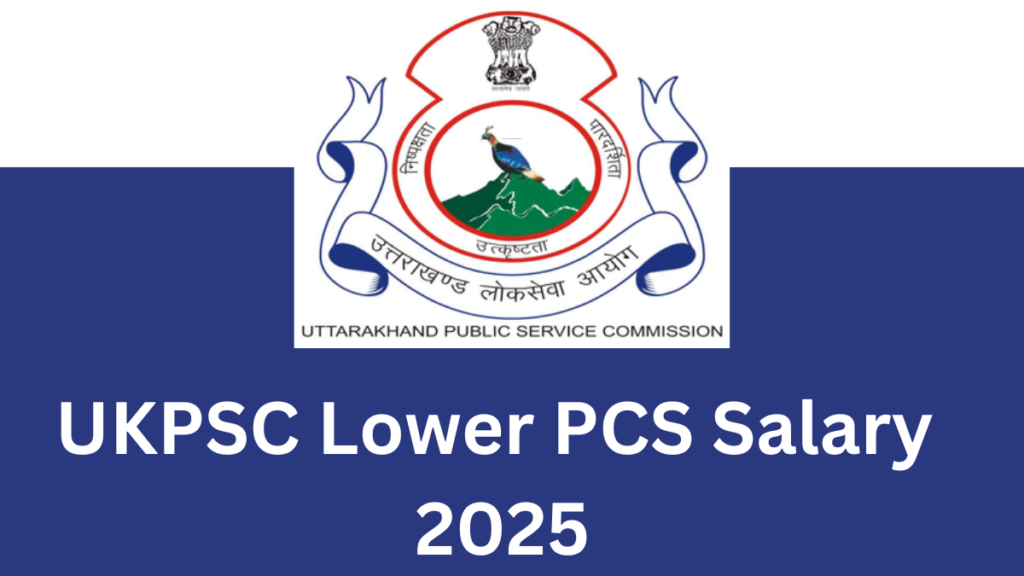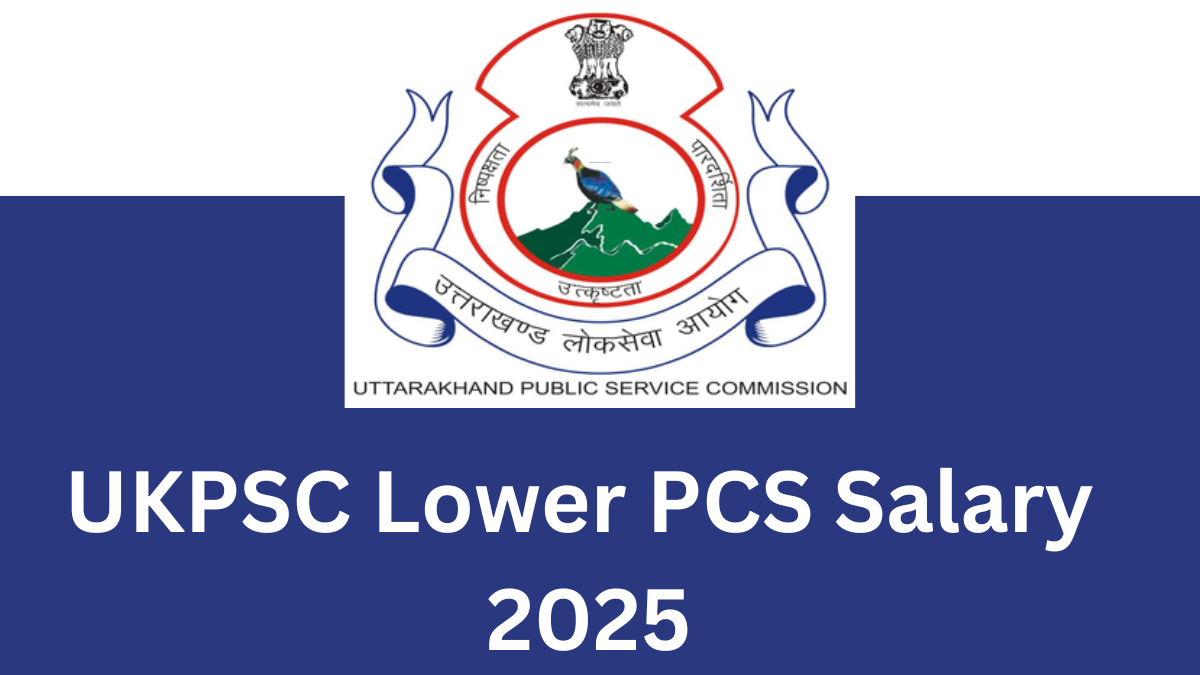The Uttarakhand Public Service Commission (UKPSC) Lower PCS Exam is a prestigious opportunity for candidates aspiring for Group B and C positions in the Uttarakhand government. These roles are highly regarded, offering financial stability, career growth, and rewarding responsibilities. Candidates who qualify for these roles can expect a structured pay scale, multiple allowances, and an excellent career path that offers opportunities for promotion and growth. Understanding the salary structure and associated benefits is essential for making informed career decisions.
The starting pay scale for UKPSC Lower PCS officers ranges from Rs 29,200 to Rs 44,900, depending on the post assigned. For officers with five or more years of service, the pay scale sees a significant boost, rising between Rs 67,000 to Rs 1,60,000. Those with 16 or more years of service can expect salaries ranging between Rs 1,18,500 to Rs 2,14,100. This structured salary growth ensures that officers are rewarded for their experience and dedication.
In addition to their basic pay, UKPSC Lower PCS officers are entitled to various benefits that enhance their overall remuneration. These include House Rent Allowance (HRA), which helps cover accommodation costs, Dearness Allowance (DA), which is adjusted periodically to combat inflation, and Medical Coverage to ensure officers and their families have access to healthcare. Officers also benefit from Provident Fund contributions and pension schemes, ensuring financial security after retirement. These comprehensive benefits make the UKPSC Lower PCS roles financially attractive and secure for aspirants.

Post-Wise Salary Structure
The salary for UKPSC Lower PCS officers varies depending on the post held. Each position is aligned with the designated pay matrix levels under the 7th Pay Commission guidelines. The following table highlights the detailed salary breakdown for key positions:
| Post Name | Pay Matrix Level | Pay Scale |
|---|---|---|
| Deputy Superintendent of Police | Level 10 | Rs 56,100 – 1,77,500 |
| Finance Officer | Level 10 | Rs 56,100 – 1,77,500 |
| Assistant Divisional Transport Officer | Level 10 | Rs 56,100 – 1,77,500 |
| District Supply Officer | Level 10 | Rs 56,100 – 1,77,500 |
| Block Development Officer | Level 10 | Rs 56,100 – 1,77,500 |
| Information Officer | Level 7 | Rs 44,900 – 1,42,400 |
| Nayab Tehsildar | Level 7 | Rs 44,900 – 1,42,400 |
| Excise Inspector | Level 7 | Rs 44,900 – 1,42,400 |
| Child Development Project Officer | Level 6 | Rs 35,400 – 1,12,400 |
| Food & Supply Inspector | Level 6 | Rs 35,400 – 1,12,400 |
| Khandsari Inspector | Level 5 | Rs 29,200 – 92,300 |
It is important to note that officers are eligible for regular salary increments based on their years of service and performance. These increments align with government norms, ensuring transparency and consistency in salary progression.
UKPSC Lower PCS Job Profiles
The responsibilities for UKPSC Lower PCS officers vary based on the post assigned. Each role plays an important part in the running of smooth administration and governance of Uttarakhand. For instance, the Naib Tehsildar handles the maintenance of land revenue records and crop statistics and ensures efficient land revenue collection. This role requires precision and accountability in handling revenue-related data.
The Deputy Jailor, on the other hand, is tasked with overseeing inmate security, maintaining detailed records of prison activities, and coordinating prisoner transportation. This role is critical in maintaining law and order within correctional facilities.
For employees assigned as Marketing Inspectors, the main duty include monitoring product quality standards, ensuring proper distribution of goods and services, and maintaining compliance with established guidelines. This role is vital for maintaining market stability and consumer safety.
Supply Inspectors play a crucial role in managing the distribution of essential commodities such as grains and other civil supplies. They are responsible for ensuring these supplies reach the public efficiently and without disruption.
The Labor Enforcement Officer’s primary duty is to ensure compliance with labor laws. They inspect workplaces, verify records, and ensure that laborers are treated fairly under legal frameworks. Their role significantly contributes to worker welfare and industrial peace.
Excise Inspectors manage excise duties and ensure businesses comply with state policies on alcohol, tobacco, and other excise-regulated goods. This position involves conducting inspections, investigating complaints, and ensuring tax compliance.
Tax Inspectors focus on auditing individuals and businesses to ensure they comply with tax regulations. They identify discrepancies, conduct investigations, and work to recover unpaid taxes. This role is crucial in maintaining the state’s financial integrity.
The Senior Cane Development Inspector is responsible for improving cane farming practices and enhancing productivity. This role requires engaging with farmers, assessing land conditions, and suggesting effective cultivation techniques to boost crop output.
Lastly, the Khandsari Inspector supervises sugar production facilities to ensure quality standards are maintained. This role ensures that the sucrose content in sugar meets specified benchmarks, safeguarding the quality of the product delivered to consumers.
Frequently Asked Questions (FAQs)
1. What is the starting salary for a UKPSC Lower PCS officer?
The starting salary typically ranges between Rs 29,200 and Rs 44,900, depending on the designated post. This attractive starting pay ensures that candidates can expect financial stability right from the beginning of their careers. Moreover, with regular increments, promotions, and additional allowances, this pay scale progressively increases over the years.
2. Are there promotional opportunities for UKPSC Lower PCS officers?
Yes, with experience and performance, officers can progress to higher pay scales, reaching up to Rs 2,14,100 for seasoned officers with over 16 years of service. The promotion structure is designed to reward dedication, hard work, and consistent performance.
3. What allowances are provided to UKPSC Lower PCS officers?
UKPSC Lower PCS officers receive several allowances in addition to their basic pay. These include House Rent Allowance (HRA) for covering accommodation expenses, Dearness Allowance (DA) to counteract inflation, and comprehensive Medical Coverage. Additionally, contributions to the Provident Fund and pension benefits ensure financial security after retirement.
4. How long does it take for salary increments in UKPSC Lower PCS roles?
Salary increments in UKPSC Lower PCS roles are aligned with service duration and performance. Officers can expect substantial pay raises after completing five years of service, with further salary growth as they progress through higher levels of experience and responsibility. This structured pay progression encourages long-term dedication and commitment to the role.
Understanding the UKPSC Lower PCS salary structure, job profiles, and growth potential helps candidates set realistic career goals. With competitive pay scales, a host of financial benefits, and opportunities for career advancement, the UKPSC Lower PCS exam remains a highly desirable career choice for aspiring candidates looking to secure a stable and fulfilling role in the Uttarakhand government.
Click here to learn more
Pari is a passionate writer known for captivating stories that blend imagination and reality. Inspired by travel, history, and everyday moments, Pari crafts narratives that resonate deeply with readers.
